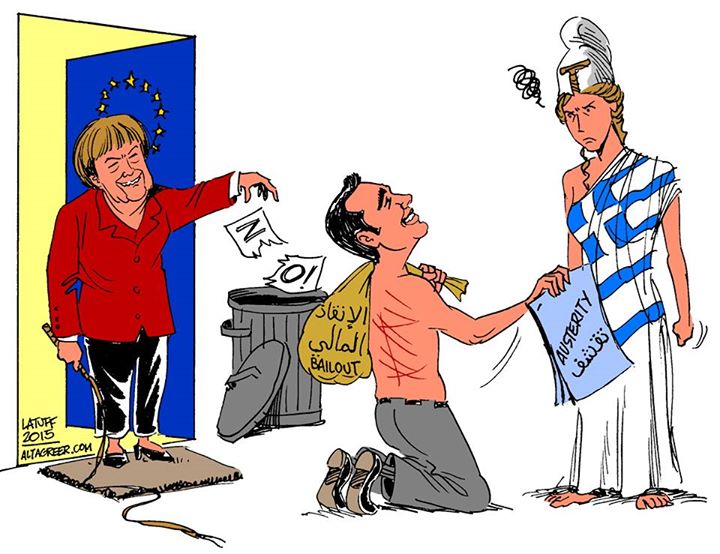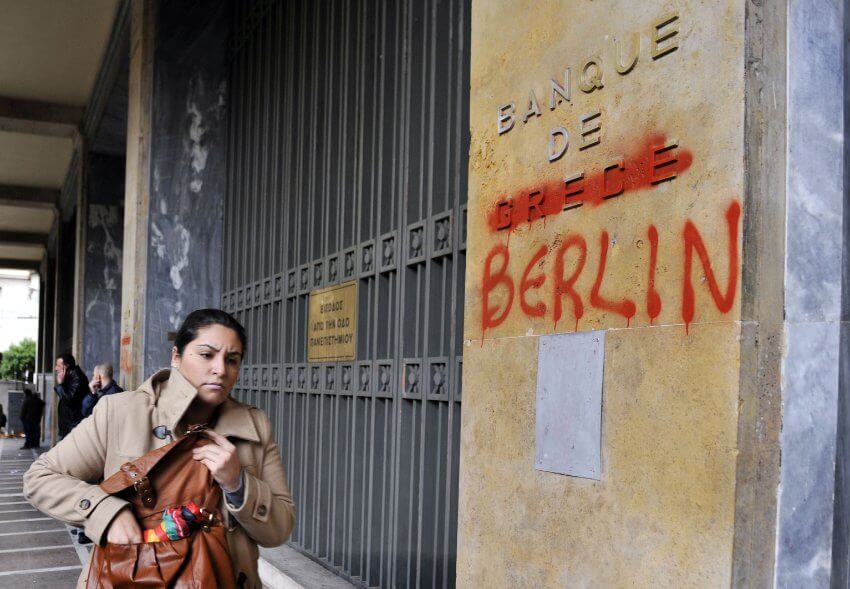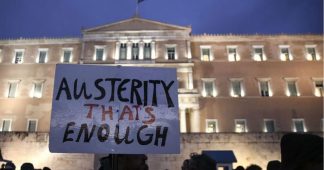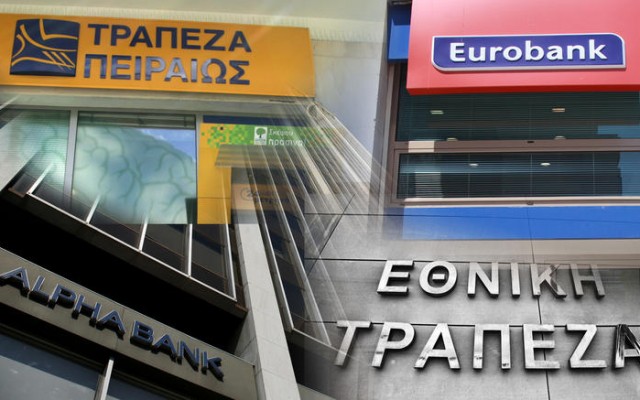Seizure of assets of the Greek state and absolute control of national, productive , economic, social planning by the European institutions
By Eleni Portaliou
The Greek Company of Property and Holdings SA was created in May 2016 by the Greek parliament as the fourth part of the general law “Urgent provisions for the implementation of the Agreement for fiscal goals and Structural Reform and other provisions”. All assets of the Greek state for sale to individuals or “co-management” with so-called institutions were transferred to this company for 99 years, a procedure which is a mere formality since this organization is directly controlled by these institutions. The Managing board and every expert involved in company transactions enjoy absolute immunity for their actions.
A. The Company does not belong to the public or the broader public sector. The provisions concerning public companies do not apply to the Company, unless otherwise explicitly stated by this law. It works according to the rules of the private economy for specific purposes, determined to be a. Repayment of the alleged public debt b. contribution to funds for the investment policy of the country. It is fully controlled by the “European institutions» ESM (European Stability Mechanism) and EU (European Commission). Therefore, it is subject to strict principles of the neoliberal economic thinking of the European integration (balanced budgets, absolute independence of the ECB, prohibition of monetary financing of deficits, close bonds with the financial markets). These principles of neoliberal principles brutally eliminate any notion of national, public, popular interest, encroaching and wasting the public wealth by destroying human labor and undermining the survival of our planet.
Equally important, within the neoliberal impenetrable wall of the Eurozone, politics has been eliminated and democracy has been buried. Referenda and other mass political engagement processes are prohibited or if made – as the recent British referendum and older ones in Ireland, France and the Netherlands – are directed towards the desired decision or their effect is simply not implemented. Disciplinary action and punishment awaited Greece after the rise of SYRIZA government and mainly, after the referendum of 07.05.2015, so undesirable by the Institutions that rejected the proposal of the European elite with a percentage of 62%.
The political crisis of the Eurozone and the European Union is in fact a sovereignty crisis of the nation states. The relationship of European institutions with the Member States is a relationship of surveillance and guardianship. Greece is under a protectorate status in the European architecture.
B. The ownership and control of state key assets by private capitals, which constitute key pillars for the control of the economy, productivity reconstruction and transformation of a country, are now the strategy of the globalized capital, of governments and of supranational associations – such as the European Union and the Eurozone – which reflect this political strategy. In Greece, which is under memorandum and is already implementing the third onerous memorandum, this political strategy is carried out through three fundamental reversals in the ownership regime.
First, banks were allocated at ridiculously low prices to foreign investors and the public, who had acquired them, lost a key regulatory tool of the economy. Secondly, the privatization of the banks facilitates the seizure of private property of the Greek citizens through the “red loans’ and securities held by the banks. The third fundamental reversal in the ownership regime concerns the seizure of public property under the pretext of the alleged public debt which amounts to 321 billion € and which is absolutely impossible to accommodate with the revenue crumbs from privatizations.
In each case there is a fundamental question of public debt, which becomes the path for grabbing the public property. The findings of the Public Debt Parliamentary Truth Commission (July 2015) substantiates why the alleged debt is illegal, unfair, shameful – hence should not be serviced.
“The Commission also found that the non-viability of the Greek public debt has always been clearly known to international lenders, the Greek authorities and the systemic media. Nevertheless, in 2010 the Greek authorities, together with some governments of the European Union conspired against the restructuring of public debt in order to protect financial institutions. Systemic media concealed the truth from the public, pretending that supposedly the rescue involved Greece as a whole rather than just the banks, yet creating a narrative that aimed to show the Greek population as somehow deserving the creditors’ tortures.”
“The amount allocated through the 2010 and 2012 rescue (memorandum) programs was controlled from abroad through complex arrangements which excluded any financial autonomy. Lenders strictly dictated the allocation of loan funds ‘rescue’, of which only a small portion, less than 10%, was directed to meet current public spending. “
In any case a sovereign state may refuse the seizure of its key assets, the loss of which directly relate to the loss of national and hence of people’s sovereignty. A sovereign state, according to international law, can and must prioritize the state property as well as the social / human rights of its citizens before the service of any acceptable or unacceptable debt.
C. Given these, the establishment of the Greek Company of Assets and Holdings SA is fundamentally challenged. The individual provisions of its establishment convinces about the absolute control of all key state Greek assets by the “European institutions” and about the purposes of the control, which are either the immediately selling of the public property to private investors or its “co-management” together with the European institutions for the benefit of big capital ‘investors’.
- The distribution of the Company’s profits is as follows: 50% is paid for the debt, the remaining profits are used for investments of the Company in accordance with the provisions set out in the articles of the law.
- The lifespan of the Company is set to 99 years – the lifespan of HRADF (Hellenic Republic Public Asset Development Fund) which previously responsible for the privatizations was just 6 years and the new company was initially estimated to last for 35 years. In the end, it is demonstrated that “institutions” and governments imagine that the future will belong to them forever!
- With the legal act of founding of the Company the following entities are directly considered to be its subsidiaries and are therefore incorporated in full possession, possession and ownership in it.
a. The Financial Stability Fund
b. The Hellenic Republic Public Asset Development Fund
c. The Public Properties Company
d. Τhe Public Holdings Company SA, which is now established
The Company may establish other subsidiaries to achieve its objectives.
All major assets of the state, a small – over current concessions – part of which was included in HRADF are transferred to the new company. As for the newly-formed Public Holdings Company, it will own the remaining Greek State participation in the public enterprises and will manage this participation according to international best practices and the OECD Guidelines. Public enterprises controlled by the Public Holdings Company are subject to adequate supervision in accordance with the rules of national and European legislation. According to the Public Holdings Company Statute, public enterprises’ shares are automatically transferred and without consideration to this company.
Specifically, as far as public utilities enterprises are concerned, through the Public Holdings Company, initially OASA (Athens Urban Transport), OSY (bus, trolley bus), the Urban Rail Transport S.A. (metro, tram, electric railway), OSE (Greek Railways), OAKA (Olympic Sports Center) and the Post Office are transferred to the superfund. EYDAP (Attica) Water Company, the EYATh (Thessaloniki Water Company), ELVO (Weapons Industry), the Athens Metro and 34% of PPC (Public Power Corporation) will follow soon afterwards.
The ownership and possession of all movable and immovable assets property belonging to the Greek State and managed by the Public Properties Company according to law 2636/1998 are automatically transferred to the superfund with the sole exceptions of protected natural areas, to be directly managed by the newly formed Company.
- Supervisory and Board of Directors
The Supervisory Board consists of 5 members. 3 of which are selected by the Greek State with the approval of the European Commission and the European Stability Mechanism (ESM) and 2 members, including the Chairman of the Supervisory Board, are selected by the EU and the ESM, with the approval of the Finance Minister. The term of office of the Supervisory Board is five years and will focus on the following topics: elect and appoint the members of the Board of Directors of the Company, revoke the appointment of its members, determine their rewards, endorse the proposal of the Board of Directors to the General Meeting of the sole shareholder (Greek State) on any amendment of the Rules of the Company and its subsidiaries, except the FSF and HRADF, and any amendment hereof. It also decides on capital increase, evaluates the activities of the Board, and has the power to control the acts of the Board, rendering the last irresponsible. In any case, the Supervisory Board also intervenes in the appointment of the Board members. The Company’s Board consists of 5-7 members elected for a term of four years with the Supervisory Board decision as defined in the Statute and under the conditions set by the Internal Regulations. The Supervisory Board appoints the President and the CEO of the Managing Board.
The Company and its direct subsidiaries, excluding the FSF and HRADF, may seek to use all methods suitable to exploit their assets. In order to carry out privatization of their assets, they can proceed to their sale or to the transfer of any rights in rem or in personam on these or the contribution of the latter in public companies or private and joint stock companies and to the subsequent sale of the shares to third parties.
• The Company and its direct subsidiaries may recruit staff under private law contracts of employment for a definite or indefinite time, with a mandate or engagement. They also cover staff needs by entering into lending contracts with workers whose private sector companies or companies’ shares are transferred to the Company or one of its subsidiaries. They may decide to transfer employees from the Company to its subsidiaries or from a subsidiary to another or to the Company. Finally, it allows the posting of personnel from government or public entities or public sector to the Company and its subsidiaries.
It is evident that labor relations and rights have been thoroughly disrupted.
Eleni Portaliou is Professor at the National Technical University of Athens / School of Architecture and member of citizens’ initiative against the seizure of assets of the Greek state











